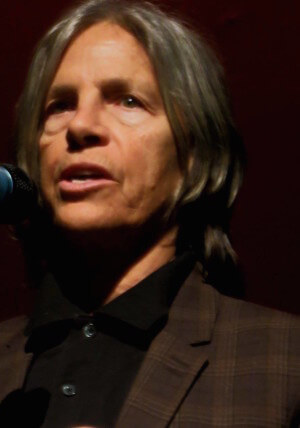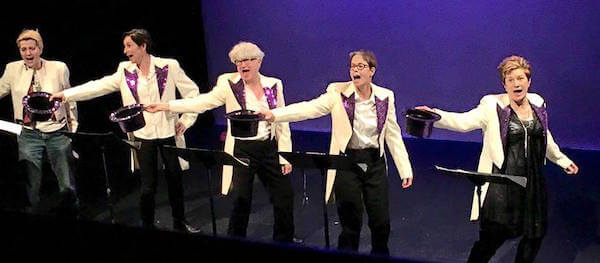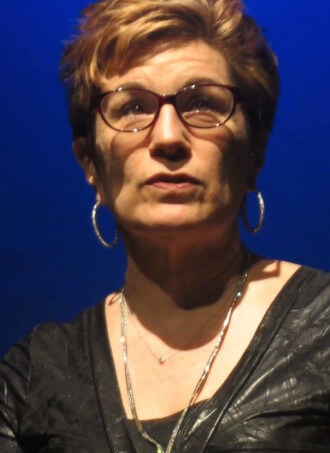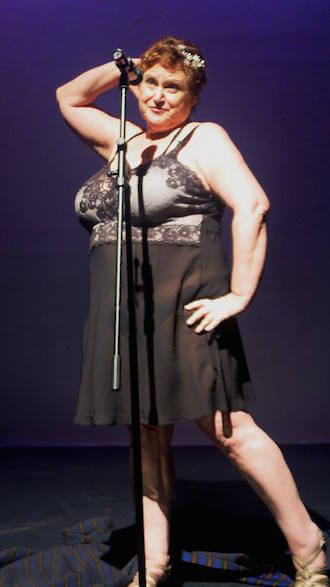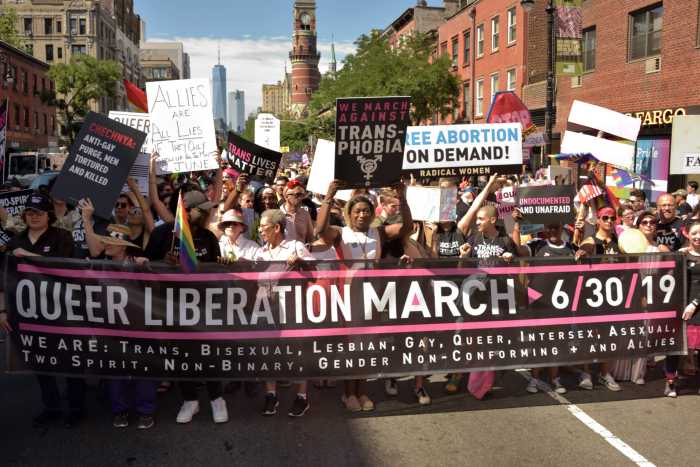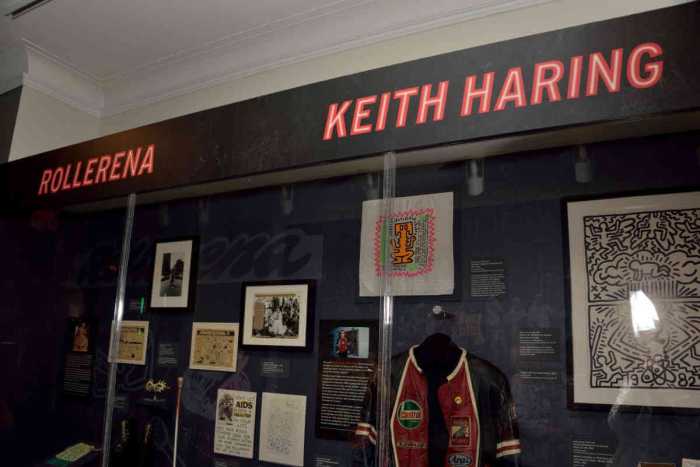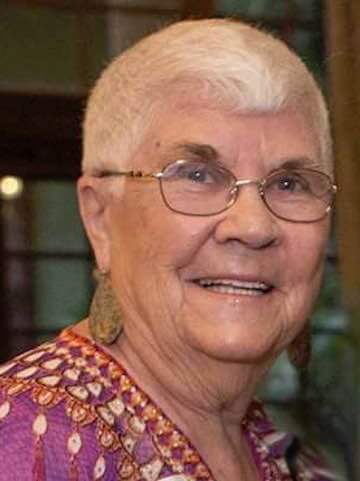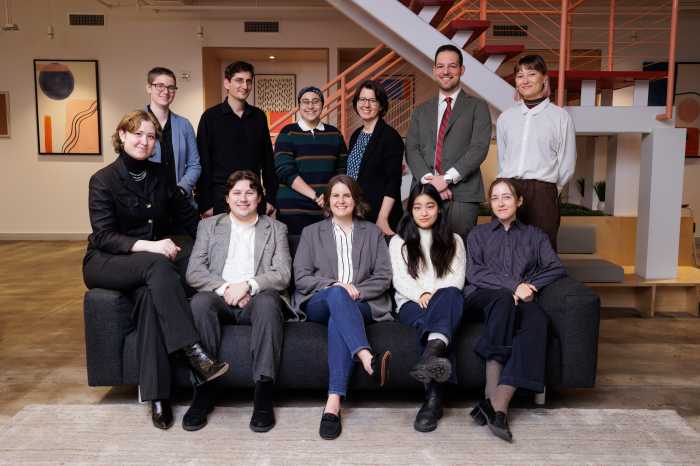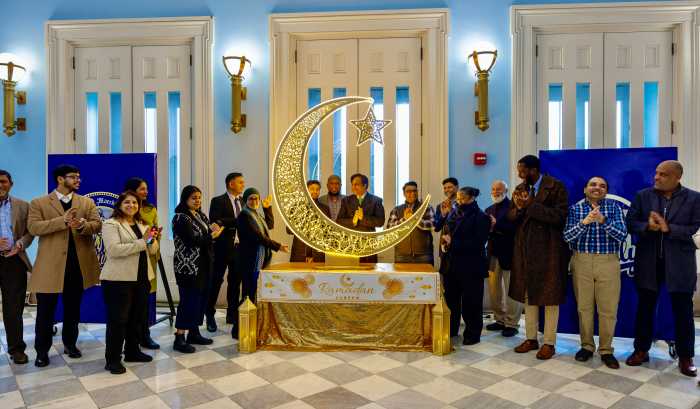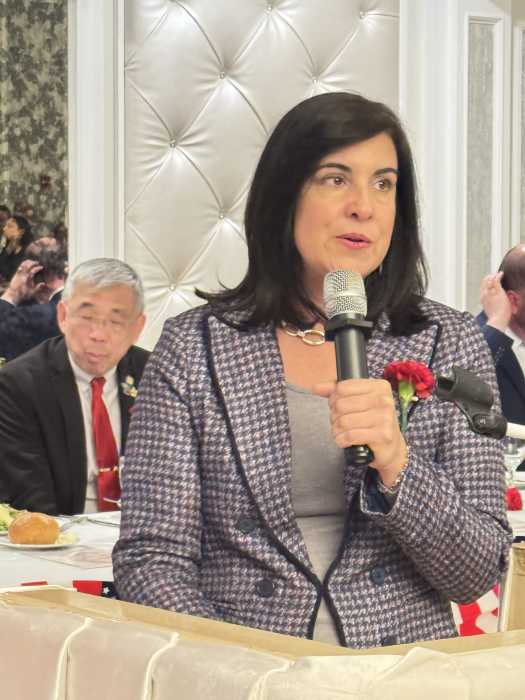BY KATHLEEN WARNOCK | Tickets for the book launch party for “Memories of the Revolution: The First Ten Years of the WOW Café Theater” on February 29 at Dixon Place sold out almost as soon as they went on sale.
The demand was such that, if those standing in front of her hadn’t gotten in, playwright and co-host Lisa Kron commented, “there might have been a crowd of lesbians of a certain age burning down Dixon Place.”
The conflagration was avoided with an additional performance added on February 28. But that was the second night, the organizers insisted — the premiere was still February 29.
Book documenting East Village lesbian theater enjoys hell of a launch party
So on Leap Day, Dixon Place’s lobby filled up with performers, friends, spouses, and families; and it wasn’t just the alumnae and old-school fans — the audience included a number of young (and younger) queer artists and writers.
Dixon Place artistic director Ellie Covan, who hosted the event on her stage, welcomed the audience, then gave the floor to the evening’s hosts: Kron, Carmelita Tropicana, and Lois Weaver.
Tropicana (the alter ego of actor, writer, and scholar Alina Troyano) is one of the book’s editors, along with performer/ writer/ teacher Holly Hughes and Dr. Jill Dolan, dean of the College at Princeton. The book celebrates the founding and first decade of WOW, still a going concern, with a permanent space on East Fourth Street, some 35 years later.
Weaver, one of the founders of Split Britches (with Deb Margolin and Peggy Shaw) welcomed the excited crowd.
“This is the high school reunion I always dreamt of,” she announced.
Weaver and Shaw were instrumental in the founding of WOW, organizing and producing the first two international WOW Festivals in 1980 and ‘81. The festivals grew into a permanent theater, first at a storefront on East 11th Street and eventually to its current home.
“WOW is still a resistant, functioning theater company,” Weaver declared. “It resists order and hierarchy.” There’s no artistic director, no board, and “no funding!”
Weaver introduced Kron and Tropicana, and the trio split the hosting duties to share more memories, introduce each round of performers, and vamp when needed during an act change.
Eva Weiss reprised an act from the variety nights at WOW with her performance of the song “The Man in the Moon is a Lady,” from the Broadway show “Mame,” gleefully claiming its homoerotic content as she took off her robe, revealing a luscious nightie, finishing with the caution:
“…So don’t ever offend her,
Remember her gender,
The man in the moon is a miss!”
Kron reminded the audience that as a collective, WOW members took on all the production roles: Weiss was known for her photography, and other members were performers, designers, costumers, stage managers, and more.
Then the Useless Fems (a band consisting of Lynn Hayes, Debra Miller and KT Thomas on bongo, ocarina and electric guitar) reunited for a short set, performing in front of a video of themselves in their original incarnation. They got the crowd to sing along to the chorus of “It’s Hard to be a Dyke in New York City”:
“…To go around just trying to be true
To the one that you’ve pledged undying devotion
When there’s so many other gals looking at you…”
Tropicana introduced Claire Olivia Moed, who wrote plays and gave fashion shows at WOW, for some funny, feminist fashion critique aimed at a couple of volunteers.
In “Memories of the Revolution,” most of the WOW members cite seeing Split Britches as the moment they realized they could make and be in theater. The crowd gave a huge ovation to founders Weaver, Shaw, and Margolin as they wrapped themselves into one costume and performed “America” from “West Side Story” in Yiddish.
The founders’ scene was followed by an excerpt from Alison Rooney’s “Waaay Beyond the Valley of the Dolls,” performed by Lucy Austin, Diane Jeep Ries and Kron (who put on a large winter hat to portray Ingmar Bergman).
Kron took off the hat to introduce Alice Forrester, the longtime stage manager, designer, director, and performer, who had put together a Power Point presentation, complete with a quiz, in which the audience was asked why socks were so important at WOW (because members would stand outside and yell, and whoever was in the space put the door key in a sock and threw it down); and also to recall Skyway Plumbing (a firm whose truck WOW members would sometimes chase when the employees harassed them). Forrester concluded with a lip synch to an Adele song, accompanied by Moe Angelos doing a nude interpretive dance, much to the crowd’s delight.
Weaver and Shaw returned to the stage to perform one of their classic routines about adultery, as engaged in by Americans, English, and French people.
Songwriter, playwright, and storyteller Sharon Jane Smith (recalled as “The Lovely Sharon Jane”), who both performed and tiled the bathroom at WOW, took the stage with her mandolin, to sing and remark that at WOW she’d learned to both talk and play at the same time.
The back screen displayed a color film by Tropicana and Uzi Parnes, beginning with a performance of “Yes, We Have No Bananas,” sung by Kron, featuring Hughes, Angelos, Margaret Healey, and others dressed as various pieces of fruit. In the film, Tropicana appeared as her alter alter ego, Pingalito Betancourt, then suddenly was onstage, in costume, as Pingalito today. The 2016 Pingalito showed no loss of energy, and pulled out a placemat with a map of Cuba as his 20th century counterpart did the same twice as large behind him.
While the pre-Internet/ early video era meant that a lot of performances were never recorded, Kron introduced a Wowette she referred to as an “auteur,” Madeleine Olnek, now a Guggenheim Award-winning indie filmmaker. Olnek presented clips from her film “Foxy Merkins” (available on Netflix streaming), her buddy comedy about two lesbian hookers. Attendees also received a DVD of Olnek’s “Codependent Lesbian Space Alien Seeks Same,” the 2011 film she adapted from her play at WOW.
Hughes talked about her introduction to the theater when, as an aspiring artist from Michigan, she walked into WOW and knew she had to be a part of it. She said she looked around for someone to ask, and gravitated to the “tallest person in the room,” a James Dean-lookalike — Shaw. She was given a date to present her first show, which she said was about casual dining and coming out from the point of view of the lobsters at the restaurant. She continued with a story about her family involving her mother, a porcupine, and an ax.
Tropicana then spoke of WOW as a family, and how she came to it from her own Club Chandalier, and spoke the names of members who are no longer living.
When Downtown icon Eileen Myles was introduced, she said she thought of herself first as a fan of WOW and loved going to the shows, and she eventually ended up writing and performing her poetry and writing and performing in her play “Feeling Blue.” She read a short piece about how she realized that not all queers were cool, and not all queer venues friendly… and that at WOW, she didn’t have to worry about that.
The evening concluded with Tropicana introducing “the crème de la crème… born on East Fourth Street… The Five Lesbian
Brothers!”
The Brothers (Moe Angelos, Babs Davy, Dominique Dibbell, Peg Healey, and Lisa Kron) performed a piece called “From Sorrow River to Shame Town,” a tour-de-force of their classic sendups of lesbian stereotypes, which concluded with a full musical number, the Brothers wearing white jackets with purple lapels and sparkly top hats.
After a final bow, the audience and the performers merged into a happy crowd talking, laughing, and embracing. Some retreated upstairs to the lounge for more talk, drinks, and to make sure they got a copy of the book and Olnek’s DVD.
“This night was amazing,” Hughes said after the performance. “The spirit of WOW was alive, in our anarchic, feminist, fierce, in-your-face thespian love.”
Some of the Wowettes have left town, taken up different professions, from drama therapy to raising quarter horses. Many still make art, wherever they are. Some of the founders have pushed from the fringes into the mainstream of American theater — and not without a fight. Hughes was one of the NEA Four, whose federal funding was vetoed on the basis of her subject matter in 1990 (an outrage successfully challenged at the US Supreme Court). Hughes remains a working artist and a professor at the University of Michigan.
Angelos just finished playing Ellen DeGeneres in Casey Llewellyn’s play, “O Earth” with the Foundry Theatre at HERE. Tropicana/ Troyano continues to make theater and art all over the world. Shaw’s “Ruff”, a solo performance about her experience of having a stroke, was presented at La MaMa, down the street from WOW. She’s also the recipient of the Doris Duke Artist Award. Weaver is a professor at Queen Mary University in London, and Margolin continues to write new plays and teaches at Yale.
Kron was the first out lesbian playwright to have a show on Broadway with “Well.” “Fun Home,” with book and lyrics by Kron, made its way from the Public Theater to Broadway, winning five Tony Awards, including Best Musical in 2015.
She said it doesn’t feel like such a long journey to her, because “I never went away.”
MEMORIES OF THE REVOLUTION: THE FIRST TEN YEARS OF THE WOW CAFÉ THEATER | Edited by Jill Dolan, Holly Hughes, Carmelita Tropicana | University of Michigan Press | $85 hardcover; $35 paperback | 242 pages

